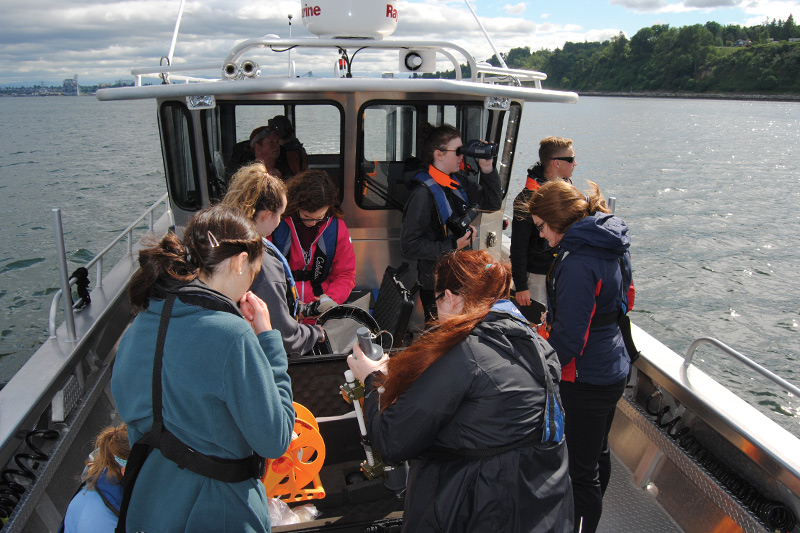
It’s a warm but cloudy Friday morning, and I am drifting along in Port Gardner on the Phocoena, a 34’ custom-built research vessel that would make any boat fanatic drool. All around me, high school students are taking water samples, tracking weather and sea conditions, collecting plankton, and counting marine birds and mammals. Captain Ardi Kveven watches these young scientists go about their work while the Phocoena slowly slides along with the one knot current. I just try to stay out of the way.
This data gathering cruise is part of the Ocean Research College Academy of which Kveven is the executive director. ORCA is a unique program offered by Everett Community College that accepts high school students for a two-year learning community focused on marine biology and environmental studies. After a competitive application process and a few college placement tests, qualified students can complete all their required high school coursework while also earning up to 90 college credits and an associate’s degree in their two years with the ORCA program.
ORCA admits up to 60 high school juniors each year, and while not all of them aspire to be marine biologists, many do go on to advanced study in the field. ORCA teaches academic and interpersonal skills needed for the next phase of their scholarly and professional lives. These are highly motivated, academically minded young men and women participating in the program, and from the second I step aboard, I am impressed by their professionalism. The scope of their research is impressive for any undergraduate student, and they are immersed in meaningful, applicable studies with far-reaching applications.
Today’s trip is part of the program’s ongoing State of Possession Sound (SOPS) research project that monitors biodiversity and other markers of the relative health of the Puget Sound ecosystem. They are gathering plankton samples – the beginning of the complex food chain in Puget Sound – and other data relevant to the study. Student research projects related to this sample collection include studying heavy metal concentrations in sensitive eel grass beds, heavy metal deposits related to Snohomish River discharge, and plankton density and larval fish abundance in Possession Sound. As I look around the Phocoena, I see the next generation of environmental stewards and marine experts. It is impossible not to be impressed.
Coleman, a young man just finishing his first year at ORCA, aspires to be a captain one day, and is carefully planning his academic and sea time in anticipation of applying to the California Maritime Academy. Kveven appoints him navigator for today’s cruise, and he keeps a watchful eye on the water as we move from collection site to collection site.

Center: ORCA students study navigation data.
Right: Student Katherine Dye oversees data collection on the Phocoena.
After collecting samples near shore at Howarth Park, just south of the Everett Marina, we steam west to the Mount Baker Terminal, where parts for Boeing jets are offloaded from barges. Farther west, on the shores of South Whidbey Island, ORCA owns a stretch of undeveloped beachfront, a gift from parents of an ORCA graduate. Students use these tidelands for eel grass studies and other sampling, and Kveven hopes to soon install a permanent data-gathering buoy at the site. In all, the students use five data collection sites in Possession Sound.
These are not typical science fair projects. The data can inform fisheries, environmental groups, tideland stewards, and transportation projects for generations to come. Partnerships with the City of Everett, University of Washington, and Shoreline Community College bolster the research capabilities and reach of the school’s work.
Funded through a combination of hard-won grants, state funds, and student fees, ORCA’s facilities at the Everett Marina include the Phocoena – built in 2014 by Bean Marine Fabrication in Clarkston, Washington – and a state-of-the- art lab, which includes a 120-gallon sea water aquarium, five classrooms, and a fully stocked oceanography research lab.
The Phocoena was the dream of Kveven, the executive director and lead grant writer of the ORCA program. After years of making do by leasing time on the Hat Island Ferry, this custom vessel is a dream platform for data collection and field work. A bow door opens for beach landings and sample gathering, cranes are installed for lowering and lifting instruments and fresh and salt water washdowns are installed in the gunwales. There are tables on deck and in the wheelhouse for laptop computers and other instruments. It is truly an upgrade from the 12-foot inflatable the school relied on before a generous grant from the National Science Foundation allowed them to purchase the vessel.
If you are out in Possession Sound on a Friday morning, keep your eye out for the Phocoena and her crew of young scientists. They might just be conducting the research that helps keep our marine ecosystem viable for coming generations. For more information about ORCA, contact Ardi Kveven (akveven@everettcc.edu) or visit their website at everettcc.edu.


